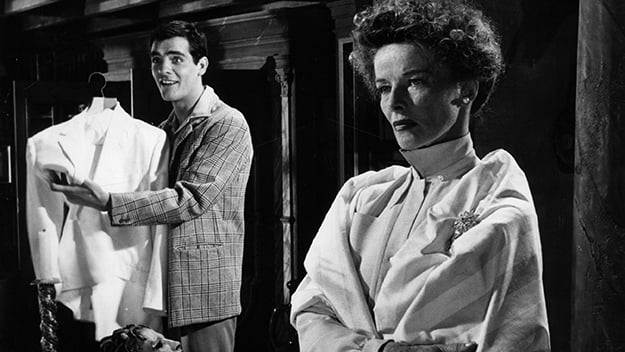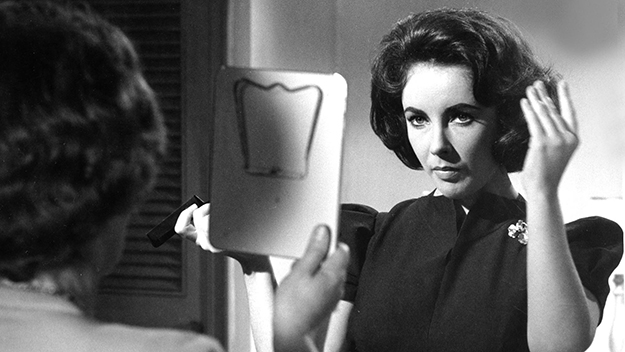Queer & Now & Then: 1959
In this biweekly column, Michael Koresky looks back through a century of cinema for traces of queerness, whether in plain sight or under the surface. Read the introductory essay.

Gary Raymond and Katharine Hepburn in Suddenly, Last Summer (Joseph L. Mankiewicz, 1959)
Coming near the end of what’s typically defined as the Golden Age of Hollywood and so after decades of movies that erased gay people, Suddenly, Last Summer, which centers around an attempt at a literal gay erasure, is the quintessential queer movie to close out the ’50s.
That an American movie studio would ever even consider adapting Tennessee Williams’s unfathomable one-act, a grotesque Freudian psychodrama inspired by Euripides that functions on the level of pure metaphor, communicates a lot about how much the playwright had become a marketable cinematic brand. The homoeroticism of Williams’s A Streetcar Named Desire, The Rose Tattoo, and Cat on a Hot Tin Roof may have been significantly tamped down in their transitions from stage to screen, yet it was undoubtedly in part their whiff of scandalous, unspoken sensuality that made them such widely embraced movie dramas of the era. In their innuendo and hushed revelation, these movies brought Williams to appreciative mainstream audiences who preferred to think of themselves as cultural sophisticates but who perhaps didn’t have much of a chance to attend New York theater. Even the horrifying Southern Gothic Suddenly, Last Summer, with its beyond-the-pale revelations of cannibalistic homosexuality, was a box-office hit, scoring multiple Oscar nominations. It’s fascinating to look at the film adaptations of Tennessee Williams as a collective project that left contradictory yet indelible marks on ’50s Hollywood moviemaking: prestige works that also were a locus of prurient curiosity for the masses.
Judged solely on cast and crew, Suddenly, Last Summer certainly would appear to be the queerest of them all: once-upon-a-time low-key lesbian icon Katharine Hepburn pitted against an unprecedentedly hysterical Elizabeth Taylor, whose primary support is played by Montgomery Clift, the era’s monument to tortured, closeted masculinity and Taylor’s real-life best pal; and as if having All About Eve’s Joseph L. Mankiewicz steering the ship weren’t enough, the script was written by Gore Vidal, the unapologetically gay writer who that same year had given the script for Best Picture winner Ben-Hur a homoerotic spit-shine. Williams himself couldn’t understand why Hollywood had come calling so soon for this particular play, which had been written just the year before, and which would seem difficult to literalize and render into anything resembling a satisfying Friday night entertainment. Nevertheless, according to Williams’s friend and biographer James Grissom, Mankiewicz’s appealingly crass, stripped-down pitch was enough to convince the playwright: “Rich, crazy over-dressed bitch in New Orleans seeks to have a young woman lobotomized, because she has witnessed the bitch’s queer son involved in sodomy, and then cannibalized by local youths he has propositioned. The doctor craves the truth, a cure, and the funds this woman can provide.” The resulting film, however, though faithful in outline, was never quite to his liking. It’s unimaginable how such a guttural, emotionally phlegmatic film could truly be satisfying to anyone, even if its bizarre, psychological explicitness makes it one of the most fascinating and pleasurably aberrant American movies of the period, a miracle of queer impropriety.

Elizabeth Taylor in Suddenly, Last Summer
To elaborate a bit: in 1937, an eccentric, filthy-rich New Orleans society matron, Mrs. Venable (Hepburn), summons a male surgeon (Clift) from the local state asylum to her home to offer him a much-needed monetary grant for his underfunded lobotomy practice, which is promised only if he agrees to perform his barbaric operation on her niece, Catherine (Taylor). The younger woman has been crazed and erratic, claims Mrs. Venable, most alarmingly in the shocking things she’s been saying about her cousin, Mrs. Venable’s son, Sebastian, who died last summer under mysterious circumstances. As Dr. Cukrowicz investigates Catherine, who has been in a private rehabilitation institution run by Catholic nuns ever since, he comes to understand that Mrs. Venable quite literally means to cut something out of her brain that will stop her from perpetuating these “hideous attacks on the moral character of my son.”
Suddenly, Last Summer charts the doctor’s attempts to extract the “truth” from Catherine, by psychoanalysis and finally hypnosis, culminating in a performance of trauma that goes beyond anything that could be properly imagined. Nevertheless, the film doesn’t shy away from doing the imagining for us. During Catherine’s climactic monologue, Mankiewicz gets as close to visually representing the forbidden as was possible, which speaks volumes about the gradually shifting codes in an industry on the cusp of a new era. Throughout the ’50s, directors had been pushing up against the limitations of the nearly 30-year-old Production Code, including Otto Preminger with taboo-busters The Moon Is Blue (1953), The Man with the Golden Arm (1955), and Anatomy of a Murder (1959), and Elia Kazan, most predominantly with the Tennessee Williams adaptation Baby Doll (1956), which had been denounced by the Roman Catholic National Legion of Decency. In adapting Suddenly, Last Summer, Vidal had somehow gotten around the code without bowdlerizing the material; in recent years, the decision to cut more overt references to homosexuality had seen borderline illegible adaptations of stage plays such as Tea and Sympathy (1956) and Williams’s Cat on a Hot Tin Roof (1958), in which the main character’s gayness is rerouted through circuitous and painfully obfuscating psychological pathways. Though the Code initially rejected the Suddenly, Last Summer script based on its synopsis, Vidal went his own route for approval, meeting with an influential Catholic priest for regular sessions in which he would show him drafts. Ultimately, Vidal convinced the man of God—“one of the dumb ones,” Vidal recalled in a 2012 interview—of the play’s moral fiber, and he finally got Hollywood’s go-ahead without having to exorcise the play’s central, troubling metaphorical conceit.
A cagey text, Suddenly, Last Summer could, depending the viewer’s persuasion, be read as a condemnation of homosexuality, which of course helps it fit right in with the enforced codes of the period. Yet only the most simplistic moralizer—which is to say much of the American public to this day—could truly believe that Williams was conceiving of the play’s events literally, and that they speak to any kind of essential human traits. Sebastian Venable, spoken of nearly constantly but never seen, undoubtedly functions as a threatening gay archetype, if only for an indoctrinated homophobic culture. Sebastian is instead terrifying for a host of other reasons: his implacable conviction in the diamond-hard meaningless of it all; his poetic, Nietzschean belief in his own aesthetic-moral superiority; the metastasizing vanity that takes the place of personality; his not-really-blinkered class privilege and the way he casually wielded it; and, finally, the way he treated his fellow man—“as if they were items on a menu,” says cousin Catherine, aghast. Sebastian’s a perfect storm of white, wealthy, sexual ravenousness; the universe’s only possible recourse is to devour him alive, his just deserts.
With Sebastian its central philosophical figure and structuring absence, Suddenly, Last Summer strikes one as a shockingly nihilistic Hollywood movie, which even a tacked-on final few moments of possible redemption can do little to alleviate. The first movement takes place in Sebastian’s elaborate garden of imported carnivorous plants, now tended to by Mrs. Venable—a widow and mother in mourning who refuses to wear black (“White was my son’s favorite color”). In this interior/exterior space, full of the oldest plants on earth, Mrs. Venable introduces the good doctor to the Venus flytrap, “aptly named for the goddess of love,” and to which she hand-feeds specially imported flies. The cannibalistic nature metaphors aren’t meant to be subtle: this devouring organism applies fairly equally to many of the characters, including Sebastian, Mrs. Venable, Cukrowicz, and certainly Catherine’s own mother (Mercedes McCambridge), who, as she comes to discover, has agreed to sign off on the lobotomy so that Mrs. Venable will give her money—a chunk of Sebastian’s inheritance for a chunk of Catherine’s brain.

Katharine Hepburn, Montgomery Clift and Elizabeth Taylor in Suddenly, Last Summer
Only Catherine seems like the possible light at the end of this tunnel of human greed and Darwinian self-preservation, though her survival depends on her ability to recall the horrors that got her there in the first place. As Shonni Enelow has written eloquently in her book Method Acting and Its Discontents, which features a chapter astutely analyzing the play by positioning it as a meta-text implicitly about method performance and the excavation of trauma within psychodrama, Catherine is a conduit for a kind of emotional truth, in which the expression of her experienced gruesome “reality” doubles as a “real” form of acting. She writes: “Catherine triumphs over the stage, playing out her emotional honesty not to cathartically expel but to theatricalize her trauma.” As Catherine, Taylor is exquisitely delirious, her climactic monologue crescendoing in a cry for “help!” that reverberates across time and space. And when we discover, finally, what “really” happened to Sebastian last summer while he and Catherine were on vacation in the wonderfully named Cabeza de Lobo, her screams feel utterly apt.
Never showing Sebastian’s face, even in hazy flashback—when he is mostly glimpsed by the camera from the waist down—is a purposeful elision. This is not simply because the play is literally about his disappearance but because it reconfigures Catherine, and most importantly perhaps, Elizabeth Taylor, as the erotic center of the film. As we learn, Sebastian used her as “bait” during their sun-dappled Spanish sojourn, as a way of collecting local boys. “All that summer, Sebastian was famished for blonds,” Catherine quivers. Previously, she claims, he had employed his mother in this fashion—“we procured for him”—using her as though a romantic partner, implying the queer incestuous “a boy’s best friend is his mother” overtones that would explode in next year’s Psycho. Through Taylor’s supernatural beauty, Catherine, however, becomes a perfectly believable worm-on-the-hook. In one of the film’s least stage-bound moments, she recalls the humiliation of being forced to perform in a revealing bathing suit for a gaggle of hungry, grasping young males. The image is pure pinup cheesecake—Elizabeth Taylor goes to the beach—but almost completely queered, a figure of complicit, relocated homosexual desire, a gay lure.
Catherine’s embodiment of queer displacement makes particularly fascinating Williams’s central conceit of gay erasure: it is the body and mind of this ostensibly heterosexual woman that are punished. She becomes the repository for the kind of scientific “corrections” that have been meted out on homosexuals across the 20th century, whether manifest in lobotomization or electroshock treatment or chemical castration. Taylor’s real-life friendship with Clift makes this all the more present and poignant in retrospect—she had been his confidante, his front. Characters in the play and film, especially Mrs. Venable, recurringly make explicit the doubling of Dr. Cukrowicz and Sebastian, handsome young men of similar build and comportment; with Clift cast as the doctor, this brings forth even more subtext. That Suddenly, Last Summer was one of Clift’s first roles following the devastating, disfiguring car accident that would contribute to his drug and alcohol addiction, leading to his death less than a decade later, only underlines the queer death drive that fuels this bizarre, loveless story: queer self-abnegation is perceptibly etched on Clift’s transformed, haunted face.
Mrs. Venable tells the doctor that during a trip to the Galápagos some years back, a voyage inspired by Melville’s novella The Encantadas, Sebastian “saw the face of God.” As one might imagine, this was not a benevolent God. The son and mother had intentionally witnessed an instance of nature at its most cruel, awfully precise in Williams’s description. Mother sea turtles deposit their eggs in the sandpits; they leave and never see their offspring. Sebastian urged his mother to return just in time to see the hatching of the sea turtles, who, pushed on by evolutionary instinct, must immediately escape to the sea to avoid the flesh-eating birds already circling above. The turtles’ fate—their soft underbellies torn apart and eaten—is ultimately mirrored in Sebastian’s. Was his terrible end occasioned by nature? Or is it an expression of social Darwinism at its worst? Any way you look at it, for Sebastian, it was a rather queer death.
Michael Koresky is a writer, editor, and filmmaker in Brooklyn. He is cofounder and editor of the online film magazine Reverse Shot, a publication of Museum of the Moving Image; a regular contributor to the Criterion Collection and Film Comment, where he writes the biweekly column Queer and Now and Then; and the author of Terence Davies, published by University of Illinois Press, 2014.







